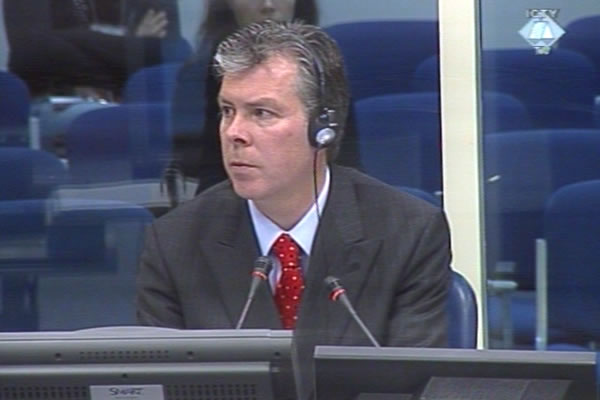Home
ARMY AND POLICE WORKED IN CONCERT
At the trial of former Bosnian Serb police chiefs Mico Stanisic and Stojan Zupljanin, prosecution military expert contends that the army and the police ‘coordinated" their actions or "cooperated’. The police was not subordinated to the army, the witness said. Had that been the case, it would have been stated clearly in military documents, and the police tasks would be specified, he claims
 Ewan Brown, witness at the Mico Stanisic and Stojan Zupljanin trial
Ewan Brown, witness at the Mico Stanisic and Stojan Zupljanin trial Continuing his evidence at the trial of former Bosnian Serb police leaders Mico Stanisic and Stojan Zupljanin, British military officer Ewan Brown contends that the police actively participated in the VRS operations. Stanisic and Zupljanin are charged with crimes of the police against Bosnian Croats and Muslims in 20 BH municipalities in 1992.
Brown drafted an expert report for the prosecution analyzing military and political situation, the military operations in the area of responsibility of the VRS 1st Krajina Corps and the role and activities of the Territorial Defense and the police.
In Brown’s view, the police participated in large-scale military operations – such as the Corridor and Vrbas operations. Brown maintains that the police also was involved in actions at municipal level, aimed at disarming the non-Serbs. The army carried out ‘joint’ actions of that kind with the police, Brown said.
In the part of the report that focuses on the cooperation with the Territorial Defense, Brown noted that the local territorial units were renamed light infantry brigades; those later became part of the 1st Krajina Corps. Based on the documents prosecutor Korner showed him, the witness concluded that the army and the police ‘coordinated their actions or cooperated’. As Brown explained, coordination required the police to established check points to secure an area or roads prior to a military attack or to coordinate fire and movement.
Brown contends that the police was not subordinated to the army because, as he claims, it ‘would have been explicitly stated in documents’. The documents would also specify the police tasks in certain operations. Based on the documents he analyzed, Brown could only conclude that the police had indeed taken part in military operations but could not say how.
When Judge Harhoff remarked that ‘if military commanders didn’t control the police then the interior ministry had to do it’, Brown replied that it ‘can be assumed that the things went that way’. According to Brown, the crisis staffs played ‘the role of coordinator’: they decided what areas were to be captured and then this was relayed to the police and military units on the local level.
As Brown also said, judging from the documents he analyzed the police commanders were responsible for the breaches of discipline and crimes committed by the police officers, except when the police force was subordinated to the army. The explicit orders subordinating the police to the army were rare, Brown said.
The prosecution military expert continues his evidence on Monday, because the accused and their defense counsels were granted a brief adjournment to celebrate the Orthodox New Year.
Linked Reports
- Case : Zupljanin i Stanisic - "Bosnia and Herzegovina"
- 2011-01-11 ARMY SERVED POLITICAL GOALS
- 2011-01-10 ZUPLJANIN DENIES PRISON VISIT
- 2010-12-09 RED CROSS IN PRIJEDOR CHARGED PRISONERS FOR FOOD
- 2011-01-17 ARMY ‘HAD NO SYMPATHY’ FOR CROATS AND MUSLIMS
- 2011-01-21 WHAT CAUSED INTER-ETHNIC TENSIONS?
- 2011-01-24 50 DAYS OF IMPRISONMENT IN TESLIC
